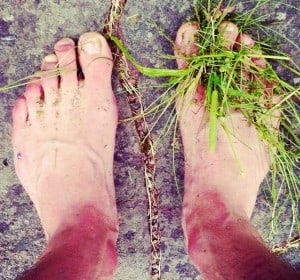Why would anyone run barefoot? Well, in the case of Ethiopian Abebe Bikila, winner of the 1960 Olympic marathon in Rome, it’s because he couldn’t find shoes that fit comfortably.So he ran (and won) the way he normally ran: barefoot. But all of a sudden today, barefoot running is a “thing” with websites and science and articles and friendly clubs. Outside such circumstances as Bikila’s, why would anyone run barefoot now?That is to say, with today’s embarrassing billions spent on designing, re-designing and (re)marketing space-age shoes, shoes tailored to every foot and style, every outfit and terrain, why would people need, or even desire, to run barefoot now?
Why do I run barefoot, I asked myself, two weeks into barefoot running on Chicago’s sidewalks, tending to blisters for the sixth time with a sterilized needle. Now with callouses that resemble shoes, I can comfortably and objectively assess this strange choice: There’s something exhilarating about running out the door with no shoes, no corporate sponsor, feeling every footfall, watching every pebbled step and minding my stride and strike to best empower my body to run safely and well. Even though I’ve had to start over with my distances, going “back to the basics” has completely reclaimed the sport for me – it has breathed new life, excitement, and attention into what had become a mechanical ‘fitness to-do.’
***
There’s a tremendous temptation these days to measure everything we do, plotting our daily results on satisfying graphs we can review before bed each night. Doing so, I notice that I often link my self-esteem with the quantity of my ‘successes’: How much did I get done today? Hm. Well, this desire for results is not necessarily a bad thing, but when I chase these numbers so single-mindedly, I can lose perspective, I can lose my ground: overvaluing the quantity of my activities often leads me to undervalue the quality of those same activities. How much? or How often? become more important to me than How well? or How deeply?
A Jesuit scholastic studying social work at Loyola University Chicago, I struggle with this tension, balancing internships, study, prayer, exercise, writing, and sharing life in my diverse communities of Jesuits, refugees, volunteers, and friends. It’s not surprising that going “back to the basics” is a frequent conversation topic with God in my prayer. Numbers alone can’t bring the confidence, ease, connection and peace I desire – for these, I pray for invitations to dig deeper, invitations to hunt refreshing quality in each little thing.
***
Running barefoot may seem a silly and trivial change to make or to flaunt. Touché – I agree. But I think of it like practice. By tweaking how I run, I’ve reclaimed the activity with a newfound awareness and commitment. By tweaking how I intern, study, or pray… you get the picture. This is where grace has room to work – when I shake things up.
The Holy Spirit, in mindfulness and adventure, invites me to reclaim everything I do and am: I’m invited not only to consider how much I do during my 9-5’s, during my nights and weekends, but to consider more deeply how I’m doing them.
Academically, socially, familially, professionally, and spiritually – where do I fuss over quantity while ditching quality? Where do I ‘do’ just for the sake of my ego tally? Where can a spirit of mindfulness and attention reinvigorate the tasks of my daily life? What small tweaks can I make, what ‘shoes can I lose,’ to drive deeper into the heart of each activity I do, whether a 9-5 or for exercise? Back to the basics: Why and How do I do what I do? How can I go simpler and deeper?
Reclaiming quality among quantity: there will be blisters, there will be strange looks, but for grace-filled renewals, each is a small price to pay.
